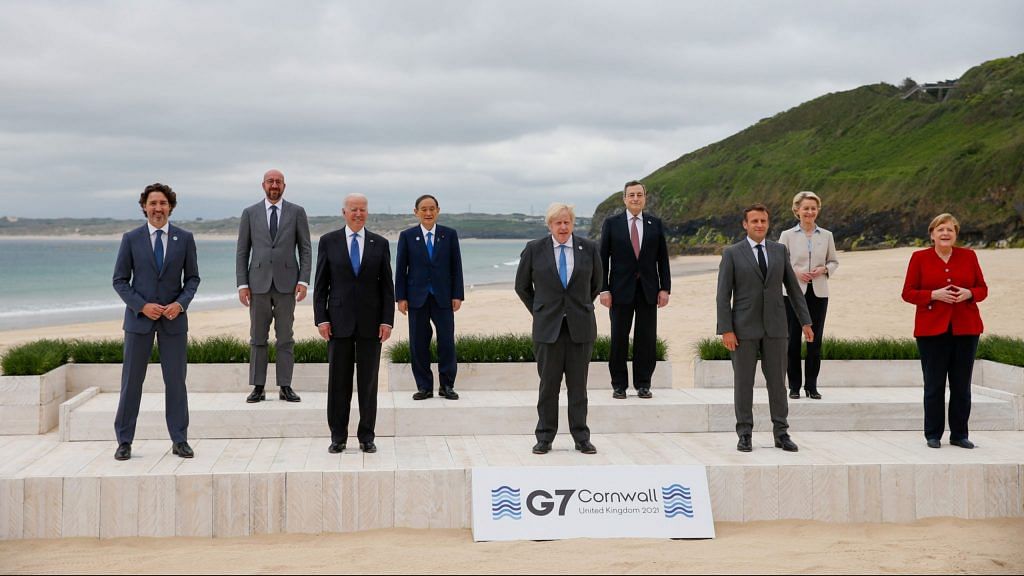London: America isn’t quite back. Europe isn’t that united. Brexit still isn’t done.
There was a lot riding on the Group of Seven summit, and a fair few telling moments came out of it.
It was the first G-7 to be held in two years, and will serve as a blue-print for international gatherings in the post-pandemic age. It was the first meeting of major leaders after four turbulent years of Donald Trump in the White House, where he frequently tore into decades-long alliances and understandings. It was also the final summit for German Chancellor Angela Merkel, who has served as a bulwark for Europe for 16 years.
It was also a logistical nightmare given social distancing requirements and snafus with live feeds and transportation. Still, host UK Prime Minister Boris Johnson persevered and there was even a communique, something that was at times impossible in the Trump era.
But the spin and bonafide attempts to reconnect under an unpredictably whimsical English sun belied the very real differences among leaders who had either never met, or had not seen each other for a while or were new on the scene. The circumstances were unique, and everyone had something to prove.
The awkward photographs — be it of Johnson trying to elbow-bump a masked Merkel who didn’t reciprocate, or the barbecue dinner where no one seemed to respect the rules of social distancing — hinted at the tensions and contradictions bubbling under the surface on issues from China to climate change.
Some, like Brexit, spilled over in a war of words between Johnson and European leaders over the unresolved issues of an acrimonious divorce. Johnson and France’s Emmanuel Macron raised the temperature there even as Merkel sought to rise above the fray.
Other fissures in key relationships were more subtle. Asked about the election of Joe Biden, she told reporters that a new US president “doesn’t mean that the world no longer has problems.” Or as Italy’s Mario Draghi put it, the general feeling was positive but realistic and the theme was “what attitude the G-7 should have toward China and other autocracies.”
Biden wants to rebuild alliances and show the US is, indeed, “back,” but in the words of the departing doyenne, the Europeans will “be frank on what we can’t accept.” She, for one, hasn’t forgotten that the U.S. and the UK didn’t allow the export of vaccines at the height of the Covid-19 crisis while the EU, sluggish in vaccinating its people, sent shots to both countries.
The sense from the meeting was that even as Biden was welcomed in part for simply not being Trump, and for being a convivial member of the group, there is no magic return to a prior “norm,” and that the days of the US dominating decision making and agenda setting and others obligingly falling into line are over. Instead, even with Merkel set to depart after an election in September, the narrative was about a more equal footing for other nations in deciding key matters.
And on China, the differences were subtle but apparent. The final communique paved the way for an investigation into the origins of Covid, which Trump had dubbed the “Chinese virus” and said without evidence was the result of a Wuhan lab leak. Some European leaders said publicly they didn’t believe that theory, even as they agreed to support a probe.
When it came to the more substantiative matter of what to do to counter China’s growing economic might and insouciance in the face of criticism, leaders struggled to present a united front. Europeans, in particular Italy and Germany, felt pushed toward an anti-China narrative by the Americans that wasn’t an accurate reflection of their conversations with Biden, according to one G-7 official.
The final language on China was not as strong as the US tried to suggest. A US official was adamant it had not been watered down, though a comparison of drafts reveals there is still some hesitancy in calling out China. In the official readouts, for example, the U.S. was at pains to point out that China was discussed even when, in the case of a 30-minute chat with Draghi, it was not even mentioned.
The economic stakes are enormous for the Europeans, who are increasingly squeezed between the two superpowers with China’s economy set to overtake its American rival earlier than expected due to Covid. And that explains the caution about pushing an anti-China message too strongly.
Macron was one leader who sought the middle ground. He warmly embraced Biden — at one point slinging his arm around him — and his official Twitter feed was littered with his interactions with the US leader.
At the same time he said France wanted to find ways to work with China and the G-7 should not become an anti-China club, even as he called Beijing an “economic rival.”
Beijing’s feathers were not ruffled either way. “The days when global decisions were dictated by a small group of countries are long gone,” its embassy in London said in a dismissive statement.
—With assistance from Alberto Nardelli and Jennifer Jacobs. — Bloomberg
Also read: Wuhan lab leak theory discussed at G7 amid push to identify Covid origin
